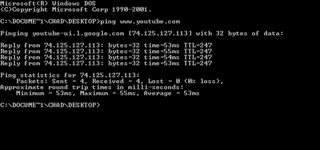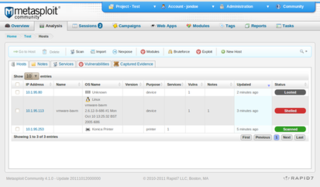Related Research Articles

Ping is a computer network administration software utility used to test the reachability of a host on an Internet Protocol (IP) network. It is available for virtually all operating systems that have networking capability, including most embedded network administration software.
A rootkit is a collection of computer software, typically malicious, designed to enable access to a computer or an area of its software that is not otherwise allowed and often masks its existence or the existence of other software. The term rootkit is a compound of "root" and the word "kit". The term "rootkit" has negative connotations through its association with malware.

Nmap is a free and open-source network scanner created by Gordon Lyon. Nmap is used to discover hosts and services on a computer network by sending packets and analyzing the responses.
A port scanner is an application designed to probe a server or host for open ports. Such an application may be used by administrators to verify security policies of their networks and by attackers to identify network services running on a host and exploit vulnerabilities.
Flooding or scrolling on an IRC network is a method of disconnecting users from an IRC server, exhausting bandwidth which causes network latency ('lag'), or just disrupting users. Floods can either be done by scripts or by external programs.
Footprinting is the technique used for gathering information about computer systems and the entities they belong to. To get this information, a hacker might use various tools and technologies. This information is very useful to a hacker who is trying to crack a whole system.
A security hacker is someone who explores methods for breaching defenses and exploiting weaknesses in a computer system or network. Hackers may be motivated by a multitude of reasons, such as profit, protest, information gathering, challenge, recreation, or evaluation of a system weaknesses to assist in formulating defenses against potential hackers. The subculture that has evolved around hackers is often referred to as the "computer underground."

The Metasploit Project is a computer security project that provides information about security vulnerabilities and aids in penetration testing and IDS signature development. It is owned by Boston, Massachusetts-based security company Rapid7.
Cracking a wireless network is defeating the security of a wireless local-area network. A commonly used wireless LAN is a Wi-Fi network. Wireless LANs have inherent security weaknesses from which wired networks are exempt.

The Perl Cookbook, ISBN 0-596-00313-7, is a book containing solutions to common short tasks in Perl. Each chapter covers a particular topic area and is divided into around a dozen recipes each on a particular problem. Each recipe has four parts: "Problem", "Solution", "Discussion", and "See Also".
Winzapper is a freeware utility / hacking tool used to delete events from the Microsoft Windows NT 4.0 and Windows 2000 Security Log. It was developed by Arne Vidstrom as a proof-of-concept tool, demonstrating that once the Administrator account has been compromised, event logs are no longer reliable. According to Hacking Exposed: Windows Server 2003, Winzapper works with Windows NT/2000/2003.

A computer virus is a type of computer program that, when executed, replicates itself by modifying other computer programs and inserting its own code. If this replication succeeds, the affected areas are then said to be "infected" with a computer virus.
Network enumeration is a computing activity in which usernames and info on groups, shares, and services of networked computers are retrieved. It should not be confused with network mapping, which only retrieves information about which servers are connected to a specific network and what operating system runs on them.
Banner Grabbing is a technique used to gain information about a computer system on a network and the services running on its open ports. Administrators can use this to take inventory of the systems and services on their network. However, an intruder can use banner grabbing in order to find network hosts that are running versions of applications and operating systems with known exploits.

WiGLE is a website for collecting information about the different wireless hotspots around the world. Users can register on the website and upload hotspot data like GPS coordinates, SSID, MAC address and the encryption type used on the hotspots discovered. In addition, cell tower data is uploaded and displayed.

Scapy is a packet manipulation tool for computer networks, originally written in Python by Philippe Biondi. It can forge or decode packets, send them on the wire, capture them, and match requests and replies. It can also handle tasks like scanning, tracerouting, probing, unit tests, attacks, and network discovery.

Email hacking is the unauthorized access to, or manipulation of, an account or email correspondence.
Arne Vidstrom is a Microsoft Windows security expert. He is noted for discovering a number of Windows security vulnerabilities, as well as for developing the Wups toolkit, "arguably the best freeware UDP scanner for NT".

Kali Linux is a Debian-derived Linux distribution designed for digital forensics and penetration testing. It is maintained and funded by Offensive Security.
010 Editor is a commercial hex editor and text editor for Microsoft Windows, Linux and macOS. Typically 010 Editor is used to edit text files, binary files, hard drives, processes, tagged data, source code, shell scripts, log files, etc. A large variety of binary data formats can be edited through the use of Binary Templates.
References
- 1 2 Mike Shema, Chris Davis, Anti-hacker tool kit, Edition 3, McGraw Hill Professional, 2006, ISBN 0-07-226287-7, pp. 403–406
- 1 2 Stuart McClure, Joel Scambray, George Kurtz, Hacking Exposed: Network Security Secrets & Solutions, Edition 6, McGraw Hill Professional, 2009, ISBN 0-07-161374-9, pp. 44–51
- 1 2 Teo, Lawrence (December, 2000). Network Probes Explained: Understanding Port Scans and Ping Sweeps , Linux Journal
- 1 2 Stuart McClure and Joel Scambray, An arsenal of attack tools is an essential part of any strong security defense, InfoWorld, Jul 24, 2000, Vol. 22, No. 30, ISSN 0199-6649, p. 59
- 1 2 Susan Elizabeth Young, Dave Aitel, The hacker's handbook: the strategy behind breaking into and defending Networks, CRC Press, 2004, ISBN 0-8493-0888-7, p. 75